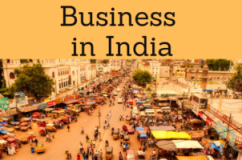Indian Free Trade Agreements, Pakistan, APTA
Agreements (India) Sri Lanka, Singapore, South Korea, Pakistan, European Union
India views regional trade agreements as building blocs towards the final objective of International Trade liberalization.
India has several Free Trade Agreements with African Countries: Angola, Botswana, Cameroon, Ivory Coast, Ghana, Liberia, Mozambique, Mauritius, Nigeria, Rwanda, Senegal, South Africa, Eswatini, the Seychelles, Tanzania, Uganda, Republic of the Congo, Zambia, and Zimbabwe.
- Indian Bilateral agreements: Sri Lanka, Singapore, Chile, MERCOSUR, South Korea, Pakistan, the EU, New Zealand, Mauritius, Bhutan, Bangladesh, Maldives, and Nepal
- Indian Regional Agreements
- ASEAN
- Bay of Bengal Initiative (BIMSTEC)
- Agreement with the Southern Africa Customs Union (SACU)
- Generalized System of Preferences (India)
- Asia-Pacific Trade Agreement
- Proposed agreements: Indonesia, GCC, Canada, Thailand, Australia, EFTA
- Trade Relations with the Andean Community
- Africa-BRICS Cooperation


The Subject “Indian Free Trade Agreements” is included within the curriculum of the following academic programs at EENI Global Business School:

Masters: International Business, Foreign Trade.

Languages:  or
or  India
India  Inde
Inde  India.
India.
Masters adapted to  Indian Students (Bharat).
Indian Students (Bharat).

Indian Free Trade Agreements.
Indian Bilateral agreements.
- India-Sri Lanka Agreement
- India-Thailand Free Trade Agreement
- India-Singapore Agreement
- India-Chile Preferential Agreement
- MERCOSUR-India Preferential Trade Agreement
- Andean Community-India Agreement
- South Korea-India Economic Partnership Agreement
- European Union-India Agreement
- India-New Zealand Agreement
- Maldives-India Agreement
- Bangladesh-India Agreement
- Nepal-India Agreement
- India-Mauritius Economic Cooperation Partnership Agreement
- Canada-India Agreement
- India-Indonesia Agreement
- Malawi-India Agreement
- India-Japan Comprehensive Economic Partnership Agreement (EPA)
- India-Afghanistan Preferential Trade Agreement
- India-Malaysia Comprehensive Economic Cooperation Agreement
- India-Bhutan Agreement
- India-Bhutan Agreement on Foreign Trade, Commerce and Transit. The main objective of this agreement is to foster International Trade and the economic development between India and Bhutan (Signed on 1995)
- Transit Trade Agreement between India, Iran and Afghanistan
Legend:
- FTA: Free Trade Agreement
- CECA: Exhaustive Economic Cooperation Agreement
- CEPA: Exhaustive Economic Partnership Agreement
- CECPA: Exhaustive Economic Cooperation and Partnership Agreement
- PTA: Preferential Trade Agreement
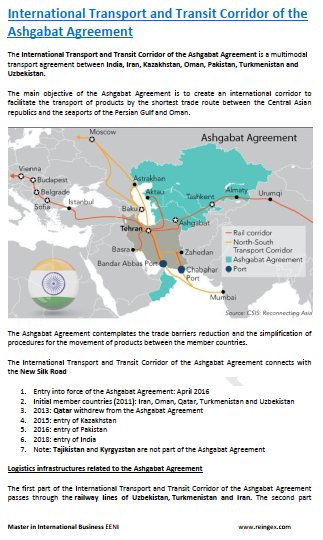
Proposed FTA/under consultation and study.
- India-Indonesia
- India-CCG Agreement
- India-Pakistan Trading Arrangement (not a formal agreement)
- India-Australia Agreement
- India-European Free Trade Association (EFTA) Negotiations on broad based trade and Investment Agreement
- India-Southern African Customs Union (SACU)
Regional Agreements.
- ASEAN-India Trade in Goods Agreement
- South Asian Association for Regional Cooperation
- South Asia Economic Cooperation (SASEC)
- India and the Bay of Bengal Initiative for Multi - Sectoral Technical and Economic Cooperation (BIMSTEC)
- India and the Ocean Rim Association (IORA)
- Asian Clearing Union
- International Trade Preferences Global System
- Global System of Trade Preferences
- Asia-Pacific Trade Agreement
- Africa-India Cooperation
- Africa-Asia (India) Strategic Partnership
- Shanghai Cooperation Organization
- Asia-Middle East Dialogue
- Arab League (observer)
- Indian Ocean Commission (observer)

- World Trade Organization (WTO)
- Agreement on Trade in Services (GATS)
- Agreement on Sanitary Measures
- Agreement on Technical Barriers to Trade
- Agreement on Preshipment Inspection
- Agreement on Safeguards
- Trade Facilitation Agreement
- World Customs Organization (WCO)
- International Road Transport Union (IRU)
- TIR Convention
- Guidelines on Safe Load Securing for Road Transport
- International Chamber of Shipping
Logistics Corridors:
- Asia-Africa Logistics Corridor
- Corridor of the Ashgabat Agreement
- India-Afghanistan Logistics Corridor
- Bangladesh-Myanmar Logistics Corridor
- North-South Corridor (India-Russia)
- Access to the:

- United Nations
- Conference on Trade and Development (UNCTAD)
- International Trade Centre
- Commission on International Trade Law (UNCITRAL)
- World Intellectual Property Organization (WIPO)
- World Bank
- African Development Bank
- World Trade Organization (WTO)
- International Monetary Fund
- OECD (Key Partner)
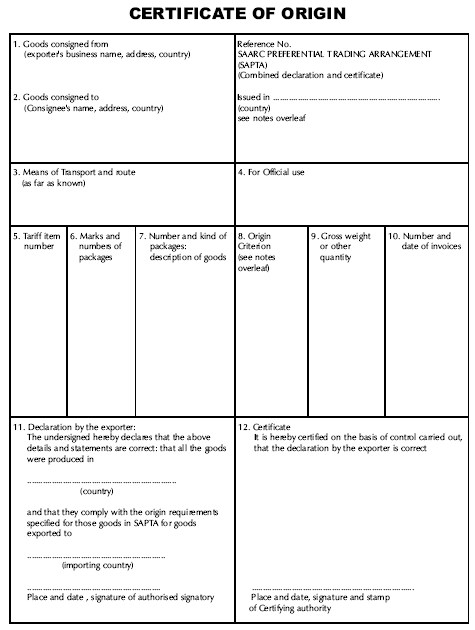
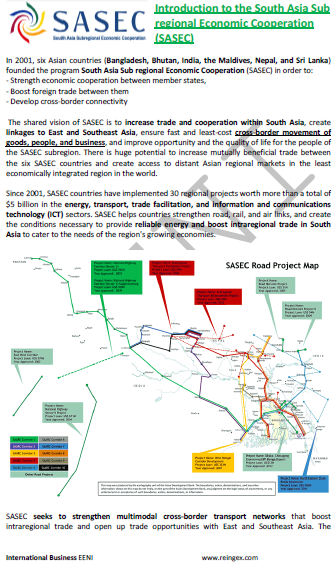
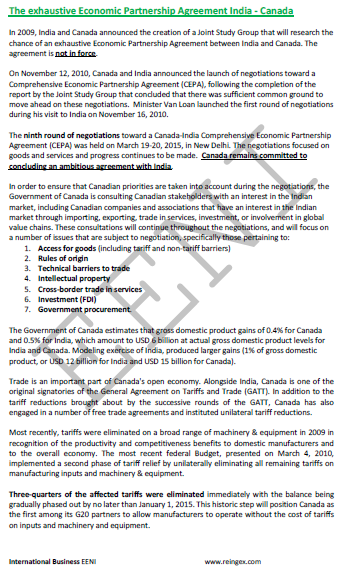
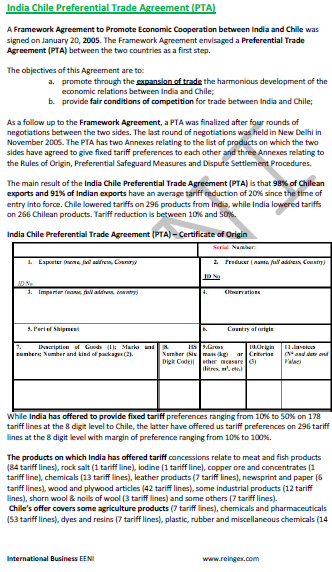
Sample: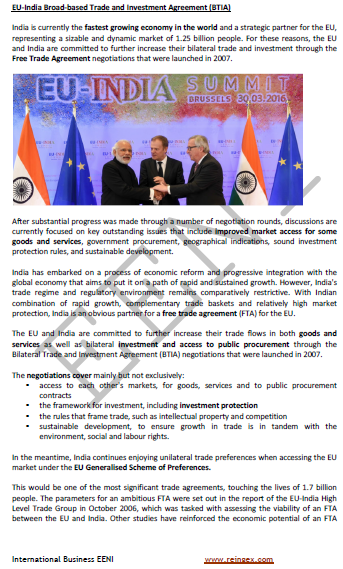
(c) EENI Global Business School (1995-2025)
Top of this page









 WhatsApp
WhatsApp